Attending - Pitt Med - University of Pittsburgh
Attending - Pitt Med - University of Pittsburgh
Attending - Pitt Med - University of Pittsburgh
- No tags were found...
You also want an ePaper? Increase the reach of your titles
YUMPU automatically turns print PDFs into web optimized ePapers that Google loves.
ATTENDINGRuminations onthe medical lifeIMAGINATIONUNLEASHEDAs traditions go, the <strong>University</strong> <strong>of</strong> <strong>Pitt</strong>sburgh School<strong>of</strong> <strong>Med</strong>icine’s Scholarly Project is relatively new.When it was initiated in 2004, this concept <strong>of</strong>a mandatory, multiyear, research-driven, limited-onlyby-the-bounds-<strong>of</strong>-the-imaginationundertaking was alsonovel. Fast-forward to today, and scholarly projectsare becoming a rite <strong>of</strong> passage at other med schools,including Harvard’s.That doesn’t surprise David Hackam, an MD/PhD,associate dean <strong>of</strong> medical student research, WatsonFamily Pr<strong>of</strong>essor <strong>of</strong> Surgery, and associate pr<strong>of</strong>essor <strong>of</strong>cell biology. He’s been overseeing the program since2010. (To learn about this pr<strong>of</strong>’s promising breakthroughsfrom his other roles as a pediatric surgeon andscientist, see p. 24.) For Hackam, the goal is simple: “Wewant our students to look beyond textbooks and developcritical-thinking skills and the ability to test hypotheses.”Students choose individual topics that interest themand then, in most cases, begin research over the summerbetween their first and second years so that theycan <strong>of</strong>ficially begin their Scholarly Projects by sophomoreyear. By graduation, Hackam asserts, they becomeexperts in their areas <strong>of</strong> research and, as a result, arehighly sought after for residencies. That fact has notgone unnoticed by aspiring physicians. According toHackam, “Informal surveys indicate that a significantnumber <strong>of</strong> our students are coming here because <strong>of</strong> theScholarly Project.”—Compiled and written byBarbara Klein and Joe Miksch—Illustrations by Michael LoteneroSUMMER 2013 31
The 144 students who marched to the strains <strong>of</strong> “Pompand Circumstance” this spring represented just the sixthgraduating class to complete <strong>Pitt</strong>’s Scholarly Project course.Among the topics? Students researched the “feasibility <strong>of</strong>a text-message-based behavioral intervention to reduce sexualrisk behaviors in young adults that present to the emergencyroom,” explored the “effects <strong>of</strong> glucocorticoid receptorneural progenitor cells on cerebral cortex development,”and investigated “attitudinal predictors <strong>of</strong> waterpipesmoking in U.S. college students.”TALKINGTHE TALKAs if med schoolweren’t time-consumingenough, these gradsalso played roles in234 national andinternational presentations.WRITES OF PASSAGEThis year’s crop <strong>of</strong> ScholarlyProjects produced 134 publishedarticles—with 43 boasting firstauthorships. Those journals includedArchives <strong>of</strong> Internal <strong>Med</strong>icine,The Journal <strong>of</strong> the American <strong>Med</strong>icalAssociation, Hepatology, and Annals<strong>of</strong> Surgery.NEAR AND FARScience knows no borders, and a few projectswere international in scope (like “the dry seasonprevalence <strong>of</strong> Tungiasis in the rural communities<strong>of</strong> Beira, Mozambique”) while others stayedcloser to campus (“the development <strong>of</strong> a healthresources guide for older adults in Braddock,Pa.”). Others managed to merge global and local(“barriers to health care utilization among newlyresettled Bhutanese refugees in <strong>Pitt</strong>sburgh”).THANK YOU,THANK YOU VERY MUCHThe class <strong>of</strong> 2013 took home 39 nationalawards (for example, the CDC ExperienceApplied Epidemiology and the Doris DukeClinical Research fellowships), as well as39 local awards (like <strong>Pitt</strong>’s Clinical ScientistTraining Program Research Fellowships).32 PITTMED
OH, O’MALLEYS!Bert O’Malley (BS ’59/MD ’63) is one <strong>of</strong> the <strong>University</strong> <strong>of</strong><strong>Pitt</strong>sburgh School <strong>of</strong> <strong>Med</strong>icine’s many success stories. His honorsinclude winning the National <strong>Med</strong>al <strong>of</strong> Science and membershipin the National Academy <strong>of</strong> Sciences. O’Malley is credited withestablishing the field <strong>of</strong> molecular endocrinology and now chairsthe Department <strong>of</strong> Molecular and Cellular Biology in the BaylorCollege <strong>of</strong> <strong>Med</strong>icine, where he is the Thomas C. ThompsonPr<strong>of</strong>essor <strong>of</strong> Cell Biology. In 2010, heand his wife, Sally (whose ’59degree is in education from <strong>Pitt</strong>),Colby Cr<strong>of</strong>t found anopportunity to augment <strong>Pitt</strong>med’s curriculum relatedto the health <strong>of</strong> lesbian,gay, bisexual, and transgender(LGBT) people. HisO’Malley-winning ScholarlyProject—under the guidance<strong>of</strong> <strong>Pitt</strong> mentor MelanieGold—resulted in animproved workshop ongender identity and sexualorientation for incoming medstudents, the creation <strong>of</strong> astandardized patient casefeaturing a same-sex couple,and an expanded workshopon human sexuality for thereproductive biology course.Past life: Cr<strong>of</strong>t’s interestin curriculum developmentgrew at <strong>Pitt</strong>. But since highschool there was never atime that he did not want tobecome a physician. Duringhis undergrad years, he volunteeredas an emergencydepartment scribe and intriage at a free clinic. “[Theseexperiences] opened my eyesto the exciting challengesand rewards <strong>of</strong> patient care,”he says.What’s next: A continuedfocus on LGBT issuesand curriculum developmentand a psychiatry residency atthe <strong>University</strong> <strong>of</strong> California,San Francisco. Afterward, onto a career in academic medicine,working to promotethe health <strong>of</strong> LGBT youth.Something goes wrongwith the colon. It becomesinflamed. At the same time,the bladder shows signs <strong>of</strong>dysfunction, but there areno obvious signs <strong>of</strong> diseasein that organ. JocelynFitzgerald set out tounderstand why. Under theguidance <strong>of</strong> <strong>Pitt</strong>’s Chet deGroat, she implicated themast cell (an immune cell<strong>of</strong> the bladder and colon),an enzyme it produces, andthe proximity <strong>of</strong> mast cellsto the sensory nerves <strong>of</strong>these pelvic organs in thisdisorder, called “pelvic organcross-sensitization.” Herrats with irritated colonshad significantly increasedbladder activity, and shefound that blunting both themast cell and its downstreamtargets can reverse theinflammation and calm theoveractive bladder.Past life: Fitzgeraldbecame interested in scienceand women’s health issuesin high school. Then shewas a double major in biologyand women’s studies atPenn State’s Schreyer HonorsCollege. She combined theseinterests in her honors thesis,which drew from theTremin Research Program onWomen’s Health, an almost80-year-old generationalstudy <strong>of</strong> women’s healththroughout the lifespan.What’s next: A residencyin obstetrics and gynecologyat Johns Hopkins Hospital andfurther research into chronicpelvic pain, which she calls“an undertreated and debilitatingproblem with a significantvoid in both research andproviders.”created the Bert and Sally O’Malley Awardsfor Outstanding <strong>Med</strong>ical Student Research to recognize lesserknownsuccess stories. The award, whichcomes with a $500 stipend, honorsa select few who exceled in theirScholarly Project research whilepursuing their MDs at <strong>Pitt</strong>. Wepresent the 2013 O’Malleys . . .Some <strong>of</strong> us use Nintendo’sWii gaming system to loseto our nephews in variousMario Brothers games.Kellie Middletonsuspected that the gamingsystem might have a highercalling. Her project foundthat, as the title statesplainly, “Playing the NintendoWii improves non-dominanthandedness in surgicallynaive student performanceon a virtual-reality surgicalsimulator.” (So a little timewith Super Mario Bros. mightnot be a waste <strong>of</strong> time for anaspiring surgeon.)Past life: Crushings<strong>of</strong>tballs. Middleton playedvarsity ball at Notre Dameand the <strong>University</strong> <strong>of</strong> Georgia,and she played pr<strong>of</strong>essionallywith the Akron Racers. Whilewith the Racers, she workedin public policy in Berkeley,Calif., and c<strong>of</strong>ounded a nonpr<strong>of</strong>itto provide opportunitiesfor underserved girls throughathletics.What’s next: A residencyin orthopaedic surgeryat UPMC and continuedresearch in orthopaedics,surgical education, and publichealth.Traumatic brain injury (TBI)—whether suffered on the battlefieldor the football field—is ahot topic. Thomas Phelps,in the lab <strong>of</strong> <strong>Pitt</strong>’s AnthonyKline, used his Scholarly Projectto find out whether the antipsychoticdrug aripiprazole mightbe an effective treatment forTBI. (Many antipsychotics currentlyused to treat TBI impairmotor and cognitive recovery.)Aripiprazole, Phelps found,did no harm to his rats’ cognitiveabilities, and it improvedtheir spatial-learning abilityand memory. “If aripiprazole isfound to improve spatial learningand memory in humans, itmay have further rehabilitativepotential to improve cognitiverecovery in TBI patients,”Phelps says.Past life: Phelps served inthe Army and was deployed toIraq as an M1A1 tank commander.This experience helped moldhis medical interests. “TBI hasbecome a signature injury forthe war in Iraq . . . As a result,many young men and women,while lucky to be alive, mustnow learn to cope with longlastingdisabilities,” he says.What’s next: After hisemergency medicine residencyat Case Western Reserve<strong>University</strong> and Cleveland Clinic,Phelps plans to continue hisPennsylvania National Guardservice as a medical corps<strong>of</strong>ficer.Rachel Orler Reidrecognized that it’s notalways easy to determinewhich docs provide the bestcare in clinic. Over the course<strong>of</strong> her Scholarly Project,which included work at RANDCorp.—in conjunction withAteev Mehrota, MD associatepr<strong>of</strong>essor <strong>of</strong> medicine—Reidexplored the relationshipbetween the information peopleuse to select doctors andclinical quality. The work ledher to delve deeper into therelationships between perception,cost, and quality <strong>of</strong>care while at the U.S. Centersfor <strong>Med</strong>icine & <strong>Med</strong>icaidServices. A related paperwas published in The Journal<strong>of</strong> the American <strong>Med</strong>icalAssociation in January 2013.Past life: Rowing. Lots<strong>of</strong> it. She was the assistantcaptain <strong>of</strong> Harvard women’slightweight crew. And beforecollege, what was then theGovernor’s School programin <strong>Pitt</strong>’s School <strong>of</strong> <strong>Med</strong>icinehelped solidify her careerpath.What’s next: Aninternal medicine residencyat Brigham and Women’sHospital in Boston andfurther investigations <strong>of</strong>how cost and informationare related to the choiceswe have to make abouthealth care.A SHOUT OUT Mentors, by their very nature, provide support,guidance, and experience, as well as the occasional dose <strong>of</strong> tough love.Scholarly Project mentors take on a three-year commitment to individualstudents. For the first time, graduates returned the favor by nominatingtheir mentors for special recognition. And the Excellence in <strong>Med</strong>icalStudent Research Mentoring Awards went to Giselle Hamad, an MD andassociate pr<strong>of</strong>essor <strong>of</strong> surgery; Brian Klatt (MD ’97, Res ’02), assistant pr<strong>of</strong>essor<strong>of</strong> orthopaedic surgery; Ateev Mehrotra, an MD/MPH and associatepr<strong>of</strong>essor <strong>of</strong> medicine; and Vu Nguyen, an MD and assistant pr<strong>of</strong>essor <strong>of</strong>plastic surgery.SUMMER 2013 33



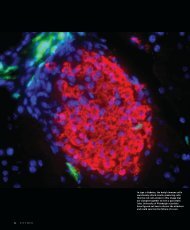
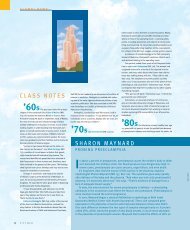
![entire issue [pdf 2.79 mb] - Pitt Med - University of Pittsburgh](https://img.yumpu.com/50435398/1/190x231/entire-issue-pdf-279-mb-pitt-med-university-of-pittsburgh.jpg?quality=85)
![entire issue [pdf 6.47 mb] - Pitt Med - University of Pittsburgh](https://img.yumpu.com/50360689/1/190x231/entire-issue-pdf-647-mb-pitt-med-university-of-pittsburgh.jpg?quality=85)
![entire issue [pdf 12.7 mb] - Pitt Med - University of Pittsburgh](https://img.yumpu.com/49831615/1/190x231/entire-issue-pdf-127-mb-pitt-med-university-of-pittsburgh.jpg?quality=85)
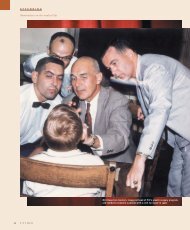
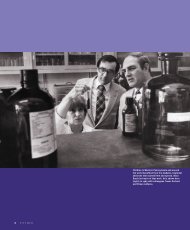
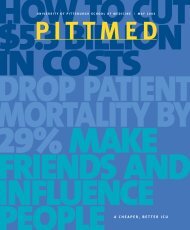
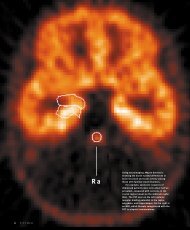
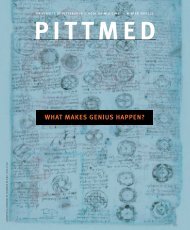

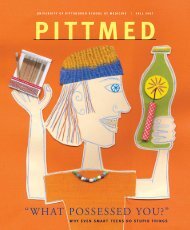
![entire issue [pdf 11.3 mb] - Pitt Med - University of Pittsburgh](https://img.yumpu.com/46685830/1/190x231/entire-issue-pdf-113-mb-pitt-med-university-of-pittsburgh.jpg?quality=85)
![entire issue [pdf 12.7 mb] - Pitt Med - University of Pittsburgh](https://img.yumpu.com/44997419/1/190x231/entire-issue-pdf-127-mb-pitt-med-university-of-pittsburgh.jpg?quality=85)